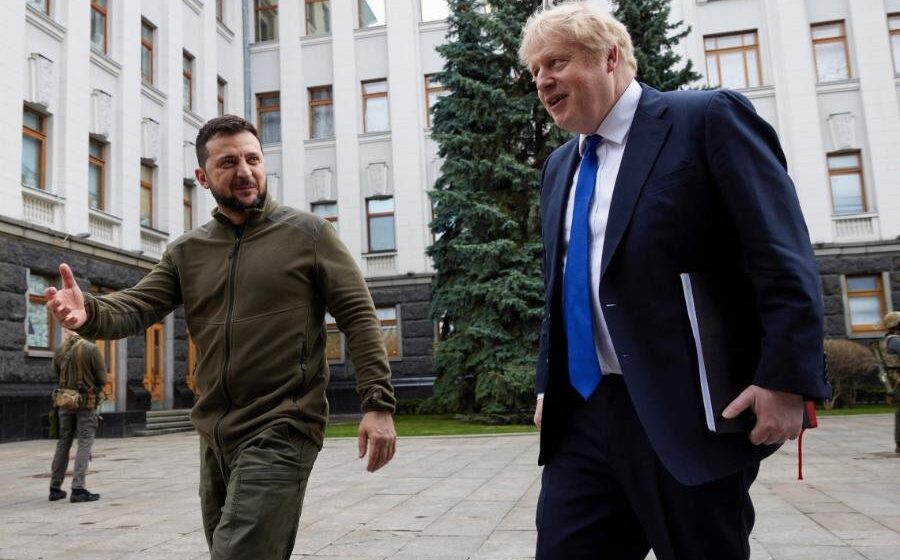UK Prime Minister Boris Johnson joined the stream of European leaders showing their support for Ukraine by travelling to the nation’s capital for face-to-face meetings with President Volodymyr Zelenskyy.
Mr Johnson’s surprise Saturday visit included a pledge of new military assistance, including 120 armoured vehicles and new anti-ship missile systems.
This came a day after he promised to send an additional $174 million of high-grade military equipment to Ukraine, saying Britain wanted to help Ukraine defend itself against Russian aggression.
Mr Johnson also confirmed further economic support, guaranteeing an additional $670 million in World Bank lending to Ukraine, taking Britain’s total loan guarantee to up to $1.3 billion.
“Today I met my friend President @ZelenskyyUa in Kyiv as a show of our unwavering support for the people of Ukraine,” Mr Johnson said on Twitter.
He said Britain was offering a new package of financial and military aid to help Ukraine against “Russia’s barbaric campaign”.
The Ukrainian leader praised the actions of the UK and encouraged other countries to follow suit.
“We must put more and more pressure on the Russian Federation, work harder to help the people of Ukraine defend it against the Russian Federation, and step up sanctions,” Mr Zelenskyy said.
“Other democratic Western states should follow the example of Great Britain. It’s time to impose a complete ban on Russian energy supplies, and increase the delivery of weapons to us.”
An image of the two leaders meeting was posted online by the Ukrainian Embassy in London with the headline: “Surprise,” and a winking smiley face.
Mr Zelenskyy said he was committed to pressing for peace, despite Russian attacks on civilians that have stunned the world, and he renewed his plea for more weapons ahead of an expected surge in fighting in the country’s east.
He made the comments a day after at least 52 people were killed in a strike on a train station in the eastern city of Kramatorsk, and as evidence of civilian killings came to light after Russian troops failed to seize the capital, Kyiv, where Mr Zelenskyy has hunkered down.
“No one wants to negotiate with a person or people who tortured this nation. It’s all understandable. And, as a man, as a father, I understand this very well,” Mr Zelenskyy said.
“[But] we don’t want to lose opportunities, if we have them, for a diplomatic solution.
“We have to fight, but fight for life. You can’t fight for dust when there is nothing and no people. That’s why it is important to stop this war.”
Russian troops that withdrew from northern Ukraine are now regrouping for what is expected to be an intensified push to retake the eastern Donbas region, including the besieged port city of Mariupol that Ukrainian fighters are striving to defend.
The Ukrainian President said those defenders were tying up “a big part of the enemy forces”, characterising the battle to hold Mariupol as “the heart of the war” right now.
“It’s beating. We’re fighting. We’re strong. And, if it stops beating, we will be in a weaker position,” he said.
Mr Zelenskyy said he was confident Ukrainians would accept peace, despite the horrors they have witnessed in the more-than-six-week-long war.
Those horrors have included gruesome images of bodies of civilians found in yards, parks and city squares and buried in mass graves in the Kyiv suburb of Bucha after Russian troops withdrew.
Ukrainian and Western leaders have accused Moscow of war crimes.
Russia has falsely claimed that the scenes in Bucha were staged. It also put the blame on Ukraine for the attack on the train station in Kramatorsk as thousands of people rushed to flee ahead of an expected Russian offensive.
Despite hopes for peace, Mr Zelenskyy acknowledged that he must be “realistic” about the prospects for a swift resolution, given that negotiations have so far been limited to low-level talks that do not include Russian President Vladimir Putin.
Newly released Maxar satellite imagery collected on Friday shows a 13 kilometre-long convoy of military vehicles headed south to the Donbas region through the Ukrainian town of Velykyi Burluk.
Velykyi Burluk is about 23kms south-west of the Russian border.
Western military analysts said an arc of territory in eastern Ukraine was under Russian control, from Kharkiv — Ukraine’s second-largest city — in the north to Kherson in the south.
But counterattacks are threatening Russian control of Kherson, according to the Western assessments, and Ukrainian forces are repelling Russian assaults elsewhere in the Donbas, a largely Russian-speaking and industrial region.



